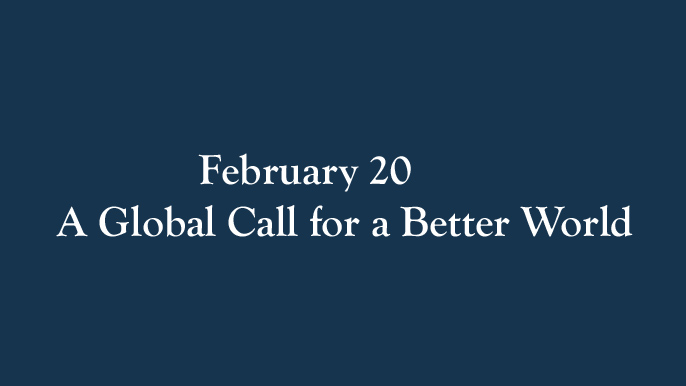Anushree Bhattacharya
On February 20, 2007, the United Nations General Assembly marked this day as World Social Justice Day, emphasizing the rights and responsibilities of every individual.
What does social justice mean?
It refers to the belief that every person deserves fair and equal treatment, reminding all citizens of their rights and access to opportunities and resources, regardless of their background. This concept spans political, economic, and social dimensions, focusing on issues like discrimination, inequality, poverty, human rights, gender equality, education, healthcare, and fair wages.
The aim is to cultivate a society where everyone can participate and contribute, free from discrimination based on caste, class, gender, race, disability, or any other barriers that hinder their dignity and potential.
Goals
The World Day of Social Justice seeks to foster a fair society by tackling social and economic disparities. Its core objectives include:
1. Ensuring Equal Opportunities
– Guaranteeing fair wages and decent working conditions for all, irrespective of gender.
– Closing the gap between the affluent and those in poverty by providing equal access to rights and resources.
2. Alleviating Poverty and Unemployment
– Advising governments to generate job opportunities for underrepresented communities.
– Promoting educational and skill development programs accessible to all.
3. Combating Discrimination and Social Exclusion
– Advocating for gender and caste equality while upholding human rights.
– Working to eliminate racism, caste prejudice, and bias against individuals with disabilities.
4. Enhancing Global Cooperation
– Urging governments, organizations, and communities to collaborate on social justice efforts.
– Supporting international agreements that uphold social protection and labor rights.
5. Promoting Environmental and Climate Justice
– Acknowledging the severe impact of climate change on vulnerable populations and providing necessary support.
– Advocating for sustainable policies that protect the rights of all citizens.
Historical Context
On November 26, 2007, the United Nations General Assembly adopted a resolution affirming February 20 as World Social Justice Day, promoting “peaceful coexistence and economic prosperity.”
This initiative stemmed from the World Summit for Social Development held in Copenhagen, Denmark, in 1995, where global leaders committed to advancing social justice, reducing poverty, and ensuring equitable employment opportunities.
The inaugural observance of World Day of Social Justice occurred on February 20, 2009, and since then, this day has been recognized worldwide to raise awareness about inequality, labor rights, human dignity, and equal opportunities for all.
Annual Themes
Each year, the World Day of Social Justice highlights a specific theme to inspire global action against social and economic inequities.
The theme for 2024 was “Global Coalition for Social Justice: Bridging Gaps, Building Alliances,” which underscored the importance of international cooperation in uplifting marginalized groups and aligning with the 2030 Agenda for Sustainable Development.
Looking ahead, the theme for 2025, “Empowering Inclusion: Bridging Gaps for Social Justice,” emphasizes the role of inclusive policies, lifelong learning, and social protections in combating systemic inequality.
Connection to Sustainable Development Goals
The World Day of Social Justice aligns with several United Nations Sustainable Development Goals (SDGs):
SDG 1: No Poverty – Ending poverty in all its forms.
SDG 5: Gender Equality – Achieving gender equality and empowering all women and girls.
SDG 8: Decent Work and Economic Growth – Promoting inclusive and sustainable economic growth and decent work for all.
SDG 10: Reduced Inequalities – Reducing inequalities within and among countries.
Relevance of Social Justice in Today’s World
Social justice is fundamental to sustainable development, ensuring fair distribution of resources and opportunities, particularly for marginalized communities needing basic services such as education, healthcare, and employment.
Key elements include:
1. Economic Equality
Social justice advocates for fair wages and safe working conditions, addressing income disparities and exploitation.
2. Gender Equality
This entails equal access to education, employment, and leadership roles for all genders.
3. Human Rights and Social Inclusion
Individuals from low-income backgrounds often face systemic discrimination. Social justice policies should promote inclusion, ensuring no group is marginalized.
4. Climate and Environmental Justice
Vulnerable communities disproportionately bear the brunt of climate change. Social justice involves environmental policies that protect these populations and provide necessary support.
How Can We Contribute?
To transform society, even small actions are vital. Achieving fair globalization requires the participation of individuals, organizations, and governments alike.
Some ways you can help include:
– Raising Awareness: Educating underserved communities about their rights and the significance of social justice.
– Advocating for Policies: Supporting fair labor laws, equal pay, and anti-discrimination measures.
– Volunteering and Donating: Contributing to organizations dedicated to social justice.
Conclusion
February 20 serves as a potent reminder that justice, fairness, and equality should be central to global development. Governments play a pivotal role in upholding social justice through effective legislation, policy-making, and activism. By confronting challenges like unemployment, poverty, discrimination, and inequality, we can work towards a world where everyone has the chance to thrive and contribute fully. Ultimately, our aim is to create a society free from discrimination and inequality, marked only by fairness, equity, and human dignity.


Leave a Reply